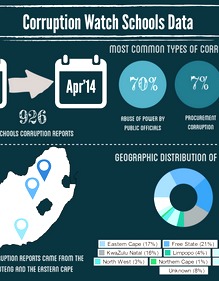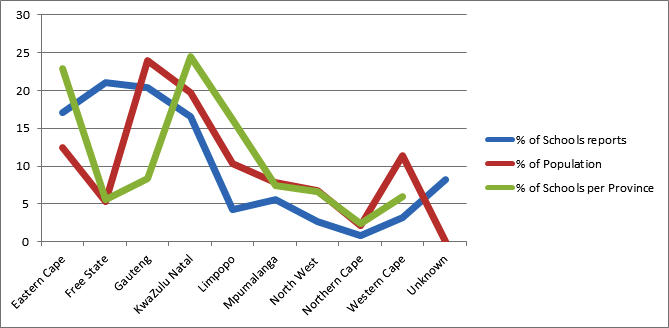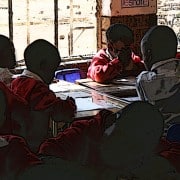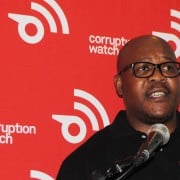|
Getting your Trinity Audio player ready...
|
 Since the launch of Corruption Watch in January 2012, corruption busters have been submitting reports detailing their experiences with corruption in their schools – and more so since the organisation officially launched its schools campaign a year later.
Since the launch of Corruption Watch in January 2012, corruption busters have been submitting reports detailing their experiences with corruption in their schools – and more so since the organisation officially launched its schools campaign a year later.
As of 20 April 2014, Corruption Watch had received a total of 926 reports on schools. Of these, 83%, or 771 reports, are classified as corruption. The majority of reports came from Section 21 schools. A further 155 reports on schools were received which we deemed not to be corruption.
Most reports came in after the launch of the schools campaign, although this is indicative of an overall increase in volume.
Equal distribution across provinces
The geographic distribution is spread relatively evenly amongst provinces, with the most reports emanating from the Eastern Cape (17%), Gauteng (20%) and the Free State (21%).
In relation to general reporting trends observed by Corruption Watch, the number of schools reports received from both the Eastern Cape and Free State are much higher than corruption reports received from these provinces generally. Conversely, the schools reports from Gauteng are much lower than the general number of reports that originate from this province.
Report volumes from the Free State are also disproportionate to the distribution of schools and the population numbers in that region. Given the higher proportion of the population residing in Gauteng, the number of schools reports is relatively proportionate – but compared to the number of schools in the province, it can be deemed quite high.
The inverse is true for KwaZulu-Natal where the high proportion of schools relative to the population and number of schools reports received is relatively low. Reports received from Mpumalanga are proportional both to the number of schools and the reports received from this province.

Abuse of power prevalent
The three most often cited types of corruption that were reported across all provinces are an abuse of power by public officials (70%), most commonly principals, as well as procurement corruption (7%) and corruption related to employment (7%).
Abuse of power could refer to financial mismanagement of schools, theft of funds or goods and wasteful expenditure on the part of governing body or principals. Financial mismanagement involves a whole host of activities including misappropriation of funds, lack of adequate financial account, disregard for processes and a lack of financial reporting to both parents and other members of the SGB. Most reports involve a combination of the above activities.
The most commonly cited culprits are principals, who either collude with certain members of the SGB, or in the schools where the SGBs does not have the capacity to manage schools funds, principals are able to mismanage funds alone. Where teachers have reported these activities, they have often noted that principals are dictatorial and aggressive when confronted, and have often intimidated those who have questioned their authority.






